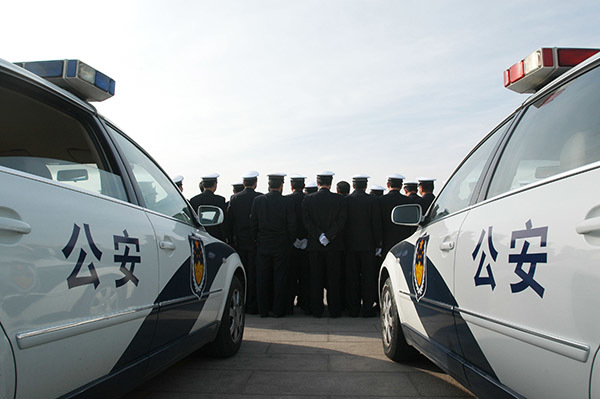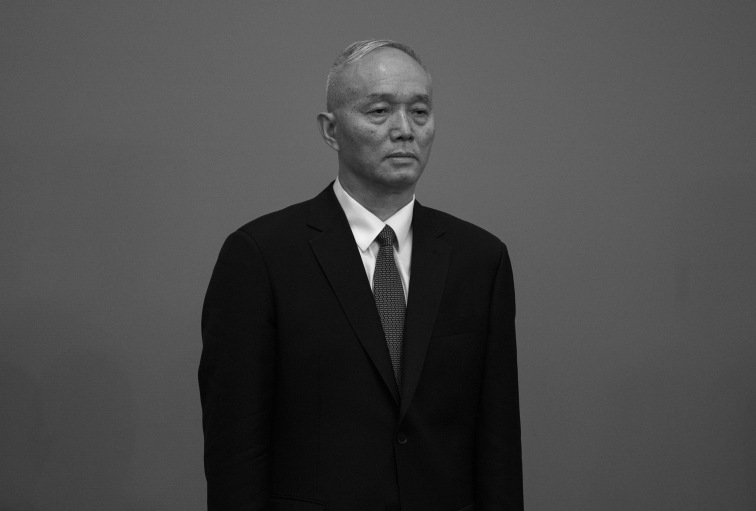The various branches of the Chinese Communist Party are barking like mad dogs. (Illustration by People News)
[People News] Recently, tensions between China and Japan have escalated dramatically, shifting from verbal attacks to a state of heightened alert, with Sino-Japanese relations heading towards their worst state in the 53 years since diplomatic ties were established. Analysts suggest that Japanese Prime Minister Kishi Nobuo's comments on 'defending Taiwan' have undermined the image of CCP leader Xi Jinping, which he perceives as a near humiliation.
On November 18, officials from Japan and the CCP met in Beijing in an effort to de-escalate the growing diplomatic conflict, but no progress was achieved. The Japanese side rejected the Chinese request and reiterated that it would not retract Prime Minister Kishi Nobuo's statements regarding 'Taiwan's situation,' while the Chinese side expressed dissatisfaction with the serious nature of the discussions and the outcome.
The officials who met that day included Liu Jinsong, Director of the Asian Affairs Department of the CCP's Ministry of Foreign Affairs, and Masaaki Kanai, Director of the Asian and Oceanian Affairs Bureau of the Japanese Ministry of Foreign Affairs.
On the same day, CCP spokesperson Mao Ning confirmed at a regular press conference that during the meeting, the Chinese side urged the Japanese side to retract Kishi Nobuo's remarks.
Japanese Chief Cabinet Secretary Hirokazu Matsuno indicated that Japan has no intention of retracting these statements. Matsuno stated at a press conference that these remarks 'do not alter the government's established position' and added that the government hopes that issues concerning Taiwan can be resolved peacefully through dialogue.
On November 18, CCTV.com published an article titled 'Four Questions for Kishi Sanae', which launched a strong critique against Kishi, accusing her of making erroneous statements and actions regarding the Taiwan issue and historical recognition, and asserting that her comments on Taiwan are illegal and invalid.
The tensions between China and Japan stem from a post made by Xue Jian, the Chinese Consul General in Osaka, late at night on November 8 on X. He wrote, 'For that kind of dirty head that extends hard, the only way is to cut it off without hesitation. Are you prepared for that?' This was an implied threat of 'decapitation' aimed at Japanese Prime Minister Kishi Sanae.
Xue Jian's 'decapitation theory' was a response to remarks made by Kishi the previous day. When questioned by a member of the House of Representatives Budget Committee about 'under what circumstances a maritime blockade in the Taiwan Strait would be considered a situation of existential crisis', she indicated that if a military attack were launched against Taiwan, and a maritime blockade were enforced using 'warships', along with other coordinated actions, it could be deemed a 'situation of existential crisis' that permits the exercise of collective self-defense. In simpler terms, 'If something happens to Taiwan, it means something happens to Japan.'
Following this, Kishi's 'Taiwan protection theory' and Xue Jian's 'decapitation theory' sparked a wave of criticism from both China and Japan, and within just ten days, Sino-Japanese relations had plummeted to a freezing point.
Xue Jian's violent remarks as a diplomat have sparked public outrage in Japan, with critics asserting that his comments "can be interpreted as a death threat against Prime Minister Kishi Sanae, which is extremely malicious." Political parties across Japan have condemned Xue Jian's threats, viewing them as an insult to both Prime Minister Kishi and the Japanese people, and a serious blow to Sino-Japanese relations. They have urged the Japanese government to take strict measures, including declaring him an 'unwelcome person' and expelling him, as well as lodging a formal protest with Beijing.
Chinese Foreign Ministry spokesperson Lin Jian stated that this was a personal statement from the diplomat in Japan, adding that "the Japanese side should not confuse right and wrong, but should reflect on its own erroneous words and actions." Lin Jian's comments suggest a defence of Xue Jian. Following this, Xue Jian deleted the post, and Kishi Sanae indicated that she would refrain from making similar statements in the future.
Kishi Sanae's supportive comments regarding Taiwan have provoked a furious response from the Chinese Communist Party (CCP), inciting internal conflict and stirring up what is termed "patriotism" among the domestic populace, which has fueled widespread anti-Japanese sentiment.
On November 12, the social media account "Yuyuantan Tian" under China Central Television not only referred to Kishi as "stirring up trouble" using homophones but also resorted to crude, street-style insults, asking, "Has your head been kicked by a donkey?" and "Full of nonsense," which caused an uproar internationally.
On November 15, the account published an article titled "China is Prepared for Substantial Countermeasures Against Japan," stating, "The Chinese people are not to be provoked; if provoked, it will be difficult to handle." The crude language "You should take a look at yourself in the urine" once again drew attention, clearly indicating that the CCP's state media operates at a level akin to street brawlers.
Hu Xijin, the former editor-in-chief of the Chinese Communist Party's official media outlet, the Global Times, stirred the pot further on November 13 by posting on X, where he angrily labelled Japanese Prime Minister Kishi Sanae as the 'evil witch' who instigated the conflict. In response, U.S. Ambassador to Japan, George Glass, entered the fray, sarcastically commenting, 'Hu Xijin has been promoting the CCP's agenda in the Global Times for so long that he can no longer tell the difference between diplomacy and provocation.'
The CCP's state media also retaliated. On November 14, the People's Daily published an article titled 'Bell Tolls,' asserting that Kishi's statements represented 'a betrayal of the One China principle and a blatant provocation against the post-World War II international order.'
In the late hours of November 13, Chinese Vice Foreign Minister Sun Weidong summoned Japanese Ambassador to China, Konishi Kenji. The use of the term 'summoned' in this diplomatic context is unusual for the Ministry of Foreign Affairs. What makes this 'summoning' noteworthy?
The term 'summoned' implies 'to convey superior instructions,' indicating that this meeting was not a routine diplomatic engagement by the Vice Foreign Minister but rather a decision made and authorised at a higher level. Historically, diplomatic interactions between China and Japan have typically used terms like 'summoned' or 'meeting,' but 'summoned' is a new addition. This indicates that the issue has escalated to a significant concern for the highest levels of decision-making, directly reflecting the state's will, and its authority is clear.
It is important to note that the term 'summons for a meeting' emerged only a week after the 'decapitation theory.' The South Korean newspaper Chosun Ilbo has analysed that this reflects a careful consideration by the highest leadership in Beijing. Reports suggest that the summons of the Japanese ambassador on that day was conducted following directives from the top leadership of the Communist Party of China.
Kawasaki Sanae and Xi Jinping reaffirmed their 'strategic reciprocal relationship' at the end of last month during a meeting in Gyeongju, South Korea. Following their discussions, Beijing resumed imports of Japanese seafood and extended the visa-free period for short-term visits by Japanese citizens to China.
However, unexpectedly, the situation took a dramatic turn just over two weeks later. The controversy sparked by Xue Jian's comments obliterated the atmosphere of détente that Xi Jinping and Kawasaki Sanae had sought to establish during their meeting in South Korea. While Xi Jinping extended an olive branch to Japan, Kawasaki did not reciprocate, leading to 'Xi Jinping's face' being perceived as one of the factors behind China's assertive stance.
Deng Yuwen, a Chinese political commentator based in the United States, recently wrote in Deutsche Welle that Kawasaki Sanae has crossed a red line by 'almost humiliating Xi Jinping's political authority.'
He further analysed that the diplomatic phrase 'summons for a meeting' highlights the sensitivity and seriousness of the issue. Within the diplomatic framework of the Communist Party of China, this indicates that the negotiation directive originates from a higher authority, potentially even Xi Jinping himself, rather than from the routine operations of the Ministry of Foreign Affairs. Such terminology typically arises only in situations where the leader feels it is essential to 'regain face.'
On November 15, the Ministry of Foreign Affairs of the Communist Party of China and the Chinese embassies and consulates in Japan issued a serious warning to Chinese citizens, advising them to avoid travelling to Japan in the near future, to increase their safety awareness, and to enhance self-protection measures. In reality, wherever Chinese tourists go, they tend to cause trouble; they take advantage of situations, create noise, behave poorly, and use rude language, which detracts from the experience. This has also become a concern for the Japanese, with some even suggesting that it might not be a bad thing if Chinese visitors stayed away.
On the same day, the China Maritime Safety Administration's website released a navigation warning indicating that from the 17th to the 19th, live-fire exercises would take place all day in certain areas of the central Yellow Sea for three consecutive days. Netizens remarked that the yellow croaker is in trouble; these unfortunate fish are dying for no apparent reason because the Communist bandits have stepped on their sensitive spots. Each time they face difficulties outside, they return home to find fish being blown up. △










News magazine bootstrap themes!
I like this themes, fast loading and look profesional
Thank you Carlos!
You're welcome!
Please support me with give positive rating!
Yes Sure!